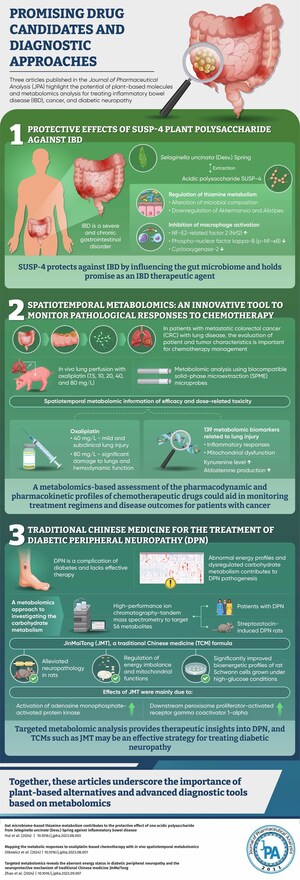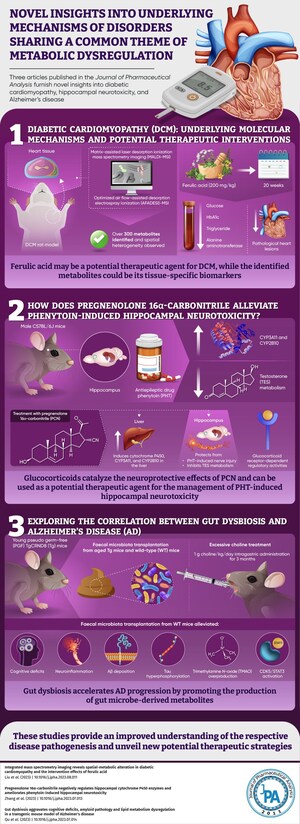Herbs that Protect the Heart: Bilobalide Reduces Cardiac Damage in Myocardial Ischemia, Says New Study in Journal of Pharmaceutical Analysis
Researchers unravel how "bilobalide", the bioactive ingredient in Gingko biloba extract, protects the heart from ischemic injuries in cardiac diseases
XI'AN, China, Feb. 25, 2022 /PRNewswire/ -- The normal functioning of human body requires a steady flow of energy in the form of adenosine triphosphate (ATP). The tricarboxylic acid (TCA) cycle, an important ATP-producing process in the mitochondria, is a major hub of metabolites and ensures a fine balance between its cyclic intermediates, referred to as the 'metabolic flux.' This flux is believed to be impaired in heart-related disorders like myocardial ischemia (MI), in which blood flow to the heart is reduced, the heart muscles, or cardiomyocytes, from receiving enough oxygen. Decreased ATP synthesis and increased glucose breakdown, or "glycolysis," mark MI, but manipulating the TCA cycle for treatment strategies is difficult.
Ginkgo biloba L. extract (GBE), which contains the active component bilobalide, has commonly been used as a popular herbal medicine in the treatment of ischemic heart diseases, but its exact mechanism of action is unknown. Scientists led by Prof. Jinlan Zhang from China's Institute of Materia Medica successfully uncovered the science behind GBE's cardioprotective effects in a new study. "GBE's regulation of energy metabolism attracted our attention because the heart works continuously and needs energy to power the circulatory system," says Prof. Zhang.
The study, which was published in the Journal of Pharmaceutical Analysis, reveals how carbon transfer from glycolysis to the TCA cycle is blocked in MI-affected cardiomyocytes. The scientists discovered that the TCA flux was clearly disturbed in these cells, which preferred to use alternate carbon sources rather than glucose to provide a constant supply of energy. Despite this, the blockage and impaired ATP production could not be averted in the injured cells. Ischemic cardiomyocytes contained larger quantities of enzymes that converted carbon sources to metabolites, both before and during the TCA cycle, which might have caused the metabolites to accumulate and disturb the metabolic flux, since they could not enter the cycle in excess.
Interestingly, on treating the injured cells with GBE, the authors found that bilobalide could protect the mitochondria and preserve ATP generation. The enzyme levels in the treated cells went down and prevented metabolite accumulation, enhanced metabolic flux, and reduced the pressure on heart cells. This modulation of metabolic flux in GBE-treated cells is different from previously reported mechanisms.
They then examined the myocardial tissue of GBE-treated rats, which showed less MI damage signs than untreated tissue samples. The findings were consistent with those of the ISO-injured cells, indicating that bilobalide protects the heart muscles.
Although metabolic drug research in MI has recently gained traction, success is still a long way off. The results of bilobalide treatment obtained in this study not only provide more evidence of MI's metabolic pathology, but also provide inspiration for new herbal therapies.
"MI is a major risk to human health around the world and elucidating its pathophysiology and potential therapeutic treatments is essential," Prof. Zhang says. "Our findings appear promising, and we expect to draw inspiration from this research into the metabolic mechanism and material basis in the therapy of MI," she concludes.
Reference
Title of original paper: Impaired tricarboxylic acid cycle flux and mitochondrial aerobic respiration during isoproterenol induced myocardial ischemia is rescued by bilobalide
Journal: Journal of Pharmaceutical Analysis
DOI: https://doi.org/10.1016/j.jpha.2020.08.008
Media contact:
Fen Qiu
[email protected]
+86-131-5206-8068
SOURCE Journal of Pharmaceutical Analysis

WANT YOUR COMPANY'S NEWS FEATURED ON PRNEWSWIRE.COM?
Newsrooms &
Influencers
Digital Media
Outlets
Journalists
Opted In






Share this article